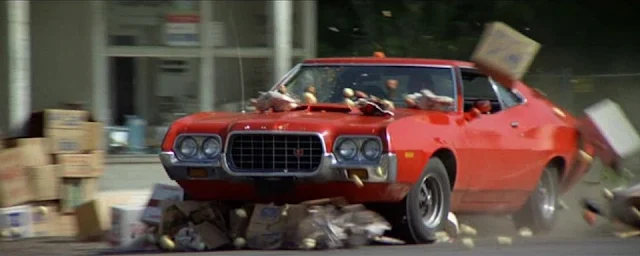 |
| Cesar Romero and Nancy Kelly in Frontier Marshal |
The title Frontier Marshal sounds like a generic Western, and it doesn't lie. It's about a stranger who comes to a lawless mining town and cleans it up with his fists and his guns. The stranger, played by Randolph Scott, is Wyatt Earp, and the movie is based on Stuart N. Lake's heavily fictionalized 1931 biography of Earp that established his legend as the man who cleaned up Tombstone by fighting it out with the bad guys at the OK Corral. So yes, you've seen it all before, in later and more celebrated films like John Ford's My Darling Clementine (1946) and John Sturges's Gunfight at the OK Corral (1957). Allan Dwan's film (from which Ford borrowed liberally) is a more modest affair. The famous gunfight in the movie is almost over before it starts. Nor is Scott's Earp a particularly mythic figure; he even gets seriously beat up before he's able to seize authority in the town. If there's a mythic figure in Frontier Marshal it's Doc Halliday*, played with surprising charm and finesse by Cesar Romero. The character of Earp is also overshadowed by two women: Jerry (Binnie Barnes), a tough-as-nails dance hall hostess, and Sarah (Nancy Kelly), a nurse who has followed her former lover, Doc, to Tombstone, trying to save him from himself. Refreshingly, the two women are given significant agency in the movie, beyond just battling for Doc's affections. What distinguishes Dwan as a director is that he never seems to take for granted the material he's given to work with. Yes, Frontier Marshal is generic and predictable, but Dwan doesn't condescend to it: He gives the scenes snap and vigor, and he gets performances that are in some ways better than they're written. Barnes, for example, turns Jerry into a force to be reckoned with. It took me a moment to recognize her as the same actress who played the snooty Linda Cram in Holiday (George Cukor, 1938). Kelly's Sarah isn't the pallid schoolmarm played by Cathy Downs in My Darling Clementine, but a woman out to get her man. And if Romero, usually a lounge lizard type, ever gave a better performance I haven't seen it. I could have done with less of Eddie Foy Jr., clownishly playing his own father, and Chris-Pin Martin's milking of the stereotypical Chicano bartender role, but they keep the film lively. Scott is less memorable than the other players, but he provides a quiet stability to the film.
Usually spelled "Holliday," but the alternate spelling was used, reportedly because of concern about litigation from the Holliday family.








